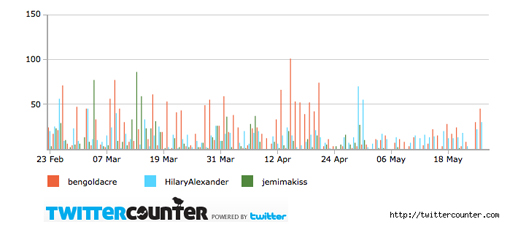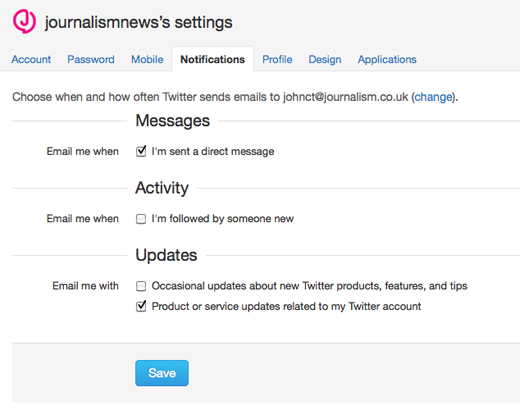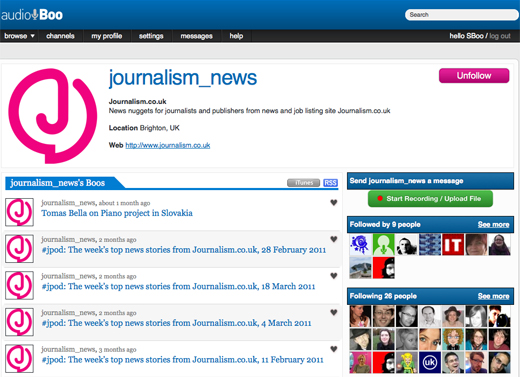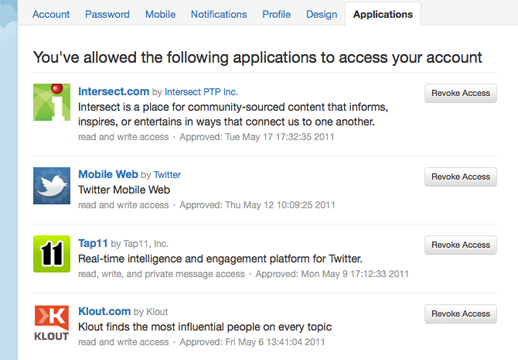Ben Goldacre, whose Bad Science blog and column in the Guardian keeps journalists writing about health in check; Hilary Alexander, fashion director of the Telegraph; Jemima Kiss, technology writer at the Guardian; Robert Peston, business editor for the BBC and Mike Butcher, editor of TechCrunch UK have all been ranked by PeerIndex as the five UK journalists with the greatest online influence.
PeerIndex measures social capital using a method very similar to that which Google uses to calculate its page rank. It automatically ranks those with a Twitter account but users can also add LinkedIn, Facebook, Tumblr and Quora accounts.
Here is a snapshot of stats on how the top five people in the list of the UK’s 100 most influential journalists online use social media.
1. Ben Goldacre @bengoldacre
In his own words: “Nerd cheerleader, Bad Science person, stats geek, research fellow in epidemiology, procrastinator.”
All his own tweets? Yes
Followers: More than 114,000
Total tweets: more than 13,500
Following: 765
Average number of tweets per day: 22
Average number of additional followers a day: 258
Facebook: a page with more than 11,000 likes
LinkedIn: no presence
Ben Goldacre’s Twitter account contains a mix of blog posts, retweets, personal opinions and conversations with other users. His behaviour is very active and social, making his feed entertaining and interesting.
2. Hilary Alexander @HilaryAlexander
In her own words: “Fashion and style news from the @Telegraph”
All her own tweets? No, they are also sent by other Telegraph fashion journalists
Followers: Almost 180,000
Total tweets: More than 5,600
Following: 165
Average number of tweets per day: 13
Average number of additional followers a day: 327
Facebook: a page with around 150 likes
LinkedIn: not active
Hilary Alexander is a name journalist who appears on television talking about fashion, hence the substantial following. Her Twitter feed consists of links to her column and comments. There is very little interaction.
3. Jemima Kiss @jemimakiss
In her own words: “Guardian writer, interwebbist and mother, not necessarily in that order. And totally offline, on sabbatical, until 28 May. Ain’t no tweetin’ going on ’til then.” We have spotted the odd rogue tweet, however
All her own tweets? Yes
Followers: More than 24,500
Total tweets: More than 18,000
Following: 581
Average number of tweets per day: 9
Average number of additional followers a day: 35
Facebook: a profile but no page
LinkedIn: 417 connections
Jemima Kiss was the most-followed British journalist on Twitter for a couple of years, but maternity leave allowed others to overtake her, even though she announced her son’s birth online within hours of the fact. When she is active her feed is a very social mix of articles, conversation, pictures and observations.

4. Robert Peston @peston
In his own words: “Business Editor for the BBC”
Followers: More than 36,000
Total tweets: More than 1,400
Following: 171
All his own tweets? Yes, some automated to send links of blog posts
Average number of tweets per day: 16
Average number of additional followers a day: 400
Facebook: a page with 482 likes
LinkedIn: not active
Robert Peston is another “name”. His Twitter account consists extensively of links to articles and observations. However, he does retweet and reference people in his observations even though he is not a conversational tweeter.
5. Mike Butcher @mikebutcher
In his own words: “Editor, TechCrunch Europe: @TCEurope Full bio: mbites.com/contact”
All his own tweets? Yes
Followers: More than 24,000
Total tweets: Almost 20,000
Following: 4,429
Average number of tweets per day: 24
Average number of additional followers a day: 30
Facebook: a profile but no page
LinkedIn: +500 connections
Mike Butcher is another conversational tweeter. It can be difficult to find his articles on his Twitter account because he is always retweeting and chatting as well as writing his observations.
Additional reporting by Sarah Booker.







